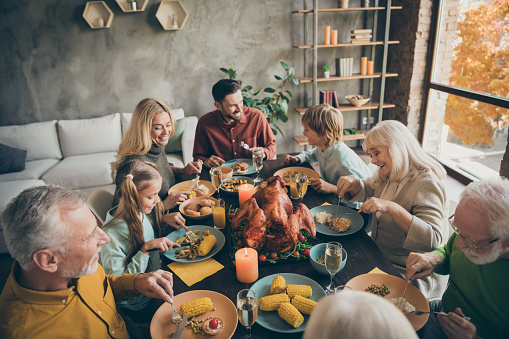With Thanksgiving approaching, you may be feeling some nerves settle in about participating in a traditional dinner. While in recent years, we have come to recognize that there is a problematic history with this holiday, many of us still use the occasion as a reason to come together with loved ones and focus on the things we are thankful for in our lives. For many, it signifies the start of the holiday season, whether you leave your turkey dinner to line up for Black Friday at midnight or not. Some people travel across the continent to see their families for dinner. Others get together with friends.
Thanksgiving has the makings of being a perfect storm for anxiety and discomfort: you may be seeing people you haven’t spent much time with of late and are nervous about fielding personal questions. You might feel an obligation to be social, even with people with whom you don’t feel you have anything in common. And there is the dinner itself, with conversations and commentary about what kind of food or how much food any given person at the table chooses to put on their plate. You may also find that you are desperate for Thanksgiving – for the familiar recipes from childhood, for the one time a year you get to see your cousins, for a family meal, and your first trip home since moving away for work or to go to school. These kinds of high-stakes events tend to get to us and challenge our boundaries, even in the face of our happiness and/or excitement.
When the Thanksgiving Holiday Becomes Stressful
You are not alone if the Thanksgiving holiday is a source of stress and anxiety for you. There can be many triggers at an event with people you haven’t seen in a long time, people you
rarely see, and/or people you are meeting for the first time. A lot of “food commentary” and diet talk can happen at these big meals, which can be worn on anyone struggling with their relationship with food and/or body image. You may feel pressured to “put your best foot forward,” even if you are experiencing burnout, heartbreak, disillusionment, or any other multitude of real-life struggles. Many people talk about the stress of keeping the peace with family members, ensuring every family member’s needs are met while also attending to your own needs. How do you decide who to prioritize? If you choose yourself over your mother’s favorite aunt, how does that impact your mother as well? Is someone at the gathering going through a tough time about which you’re trying to be sensitive? These social rules and restrictions can begin to feel like walls closing in when all you want to do is wear your stretchiest pants and enjoy a hearty meal with the people you love. If it’s someone you don’t have a close relationship with, you might worry about offending them; is it worth it for this once-a-year gathering? Will it cause a scene? Are others at the table thinking the same thing and judging you? It can be exhausting.
What is a Healthy Boundary?
Before we can talk about holiday stress and relationship issues, it is important to know what boundaries are, regardless of the time of year. We talk a lot about boundaries at our therapy practice in Woodland Hills; they are an essential tool for overall wellness.
- Healthy Boundaries are limits that are placed that create a feeling of safety and respect. You can have boundaries about how much of your personal life you’re comfortable sharing at work, boundaries about how you spend your time, boundaries about how and where you are comfortable with physical contact, and more. Every person has boundaries, but many of us struggle to name and enforce them. Everyone’s boundaries are a little different, which can be difficult to remember. Something that might feel very obvious to you might not be perceived the same way by someone else. For example, different people have different boundaries about physical space.
- Healthy boundaries nourish relationships because they provide a framework in which to meet and respect one another’s needs. In communicating your boundaries with people in your life, you are giving them a roadmap as to how to create a feeling of safety and support for you. In respecting the boundaries of others, you are doing the same for them. In mutual relationships, the sharing of boundaries fosters open communication, and open communication fosters the sharing of boundaries. When we feel safe sharing our needs with another person, we are more likely to do so. At the same time, having our needs listened to, respected, and met reassures us that communication with the other person is not and will not be in vain.
3 Ways to Set Healthy Boundaries During Thanksgiving 2022
1) Identify your needs:

Before you even reach the house, the event, or the dinner table, it is important for you to know what it is you need in order to feel safe, respected, and happy at whatever gathering(s) you are attending.
Identifying your needs mean a couple of things and making a couple of specific considerations. It is about identifying how you want to celebrate this holiday. Do you need more connection, or do you need more alone time? Do you need more rest, or do you need to travel? Do you need to avoid certain conversations or people; do you ideally need more time with certain people or in certain environments? Is there a reasonable way to achieve that for yourself?
The second part of identifying your needs is about understanding your limits. We can all anticipate some discomfort when we are in a setting with people we may not see regularly or in a larger group of people than we are used to. You need to be able to know when you have had enough connection or enough rest. When will you know your needs are being met? Or being violated? Will it be when you decline an offer for a drink, and someone pushes back? Will it be when a certain topic of conversation has gone on for too long, maybe after you’ve asked to change it? Will it be when you start to feel your neck and shoulders hunching up? When your stomach starts to feel uneasy? What nonverbal cues can you rely upon to affirm to yourself that you’ve reached a limit, are approaching discomfort, or need some help?
You want to take time to reflect, explore, and identify these needs so you can move to the next step. This step isn’t about solving all the aspects of these needs as you think of them; that will bog you down in logistics. It is about being open and honest with yourself about the facts of your situation. This means that you may identify some needs that will be easier to meet than others. All of them belong on your list. Ideally, all will be respected. But at the very least, you owe it to yourself to be clear on what you are seeking.
2) Communicate your needs:
Boundaries are set only once they are communicated. Without communication, a boundary you’ve identified is really just a wish or a hope. Sometimes, we get lucky in that those around us naturally respect boundaries without realizing. But we cannot rely upon our values aligning with everyone we meet. We need to be able to articulate what our needs are unapologetically and give the people we encounter the opportunity to respect us by honoring them.
This step tends to be the most intimating part for most people. Secretly, most people wish others could just respect their boundaries without them having to express and advocate

for them. Stating our needs and being firm on our expectations feels confrontational, which is often anxiety-provoking. This may be trickier for you if you were raised in an environment where your needs and boundaries were disrespected and/or shot down.
When it comes to an event like Thanksgiving, there may be many people who are set to attend, and you may not want or be able to communicate your boundaries with each individual person beforehand. Depending on the situation, you may identify specific people to whom you are going to communicate. For example, if you’re going to your parent’s house and you have a close relationship with your mother, you may advise your mother as to specific boundaries that you will have in place. This allows her to be prepared to support you if there is an incident at dinner or to understand if you have to excuse yourself or even if you find that you want to leave the dinner. Another person you might communicate your boundaries to beforehand is your date if you are bringing a partner to dinner or a sibling. These are likely to be people around your age with whom you feel comfortable being honest.
Communicating your needs at the event itself may feel more overwhelming because it can involve making a statement in front of a group of people. If you have determined for yourself that you don’t appreciate comments about what is on your plate, for example, you are probably bracing for the moment when you have to take a deep breath and decline to continue a conversation about it. If you are single, and there is always a running commentary about it, or if your profession isn’t understood or appreciated by certain people, and they tend to “suggest better options,” this yearly event may be rife with a need to have boundaries in place.
Stay consistent as you communicate your needs. You do not owe anyone your discomfort, embarrassment, guilt, or shame just because that person is nosey or downright rude. Remember that we all have boundaries whether we’ve taken the time to explore them or not. If you come from a family where no one asserts their boundaries, you can feel like an outlier in upholding them for yourself. But it is not your job to suffer just because other people are doing so.
3) Be compassionate towards yourself and others:

It is okay if setting boundaries is hard for you. This doesn’t mean it always will be. Be kind to yourself as you find your way through this process. Most of our important boundaries are tied to something we feel very strongly about with our mental well-being or physical safety. This can leave us feeling very vulnerable when we are sharing or being firm about our boundaries. It can be tiring work that requires some rest and relaxation afterward.
It is also important to have some compassion for others as they learn to respect your boundaries. It is not easy to be faced with others who question our boundaries, which makes it very easy to resent and begrudge them. But you can set your limits with love, assuming their intention isn’t to harm you, and approach them from there. You can be firm with others and also have patience with them. At times, you will find that you are right: they have your best interest at heart and wouldn’t want to cross your boundaries on purpose. Other times, you will be disappointed to learn that they seem more interested in “being right” or showing you how they would handle something. There will be pushback. Sometimes that might be because others were not prepared for the boundaries you are practicing, and they need some time. Maybe the boundaries you are setting trigger some unhealed issues in them. It is not up to you to change your boundaries as a response to the work not done by others. Having compassion for them is a form of forgiveness; it allows us to let go of the negative emotions that harm us.
Sometimes having others push back on our boundaries can be a good thing as it gives us more insight and clarity on why these boundaries were important to set in the first place. Looking at all experiences as lessons to learn from takes away the resistance that they are happening in the first place. When we accept what is true, we can better deal with it. This means we can delve deeper when needed or seek self-care to help us deal with the emotions that have arisen.
When we think about our highest Thanksgiving ideals, we think of gratitude and togetherness with loved ones. We don’t want to struggle against a tide of commentary or decisions that make us uncomfortable.
We don’t want to have to confront people and advocate for ourselves. But that work is important, and we have every right to do it. Sacrificing your comfort and wellness to create the illusion of everyone getting along doesn’t actually serve you or the other people at the table. You have every right to communicate your boundaries and respond accordingly to how they are received. It is what is best for you and, ultimately, for your relationships.
Individual Therapy Services at Embracing You Therapy
Anxiety treatment in Woodland Hills, CA is a personal time, and safe space for you to work on having a better relationship with yourself, your feelings, and your ideal life. We offer individual, couple’s, or group therapy for adults at Embracing You Therapy.
Contact us today for your complimentary 20-minute phone consultation with one of our Client Care Coordinators.
Meanwhile, check out our blog library for more readings on anxiety therapy!




